有限责任公司是美国一种融合了公司与合伙企业特征的企业结构。它提供有限责任保护,即所有者个人资产免受企业债务和法律诉讼的牵连。与股份有限公司不同,有限责任公司无需设立董事会等正式管理架构,可采用成员直接管理或指定经理人管理两种模式。
在成立有限责任公司时,首要决策之一便是选择注册州份。美国各州均设有独特的优惠政策、监管条例和税收制度,这些将直接影响有限责任公司的运营成本与盈利空间——从特拉华州、怀俄明州的亲商环境,到内华达州的税收优势,注册地的选择将关乎企业法律责任、财务健康等关键维度。
无论您是本土创业者还是意图进军美国市场的国际商人,选择适合的有限责任公司注册州都将影响长期发展成效。下文将详解各州对有限责任公司的设立政策,并指导如何为企业匹配最优注册地。
本文内容
- 有限责任公司最适合哪些类型的企业?
- 成立有限责任公司的利弊分析
- 有限责任公司税务基础
- 如何为您的有限责任公司选择合适的注册州
- 最适合注册有限责任公司的州
- 非公民注册有限责任公司
有限责任公司最适合哪些类型的企业?
根据美国人口普查局数据,2024 年 6 月全美新增企业数量超过 430,000 家。虽然有限责任公司适用于多数企业,但并非所有企业的最优选择——寻求大规模风险投资或计划上市的企业可能会发现股份有限公司更具优势。以下企业类型最能从有限责任公司特性中获益。
专业服务: 咨询师、自由职业者、会计师、律师等专业人士常选择有限责任公司,因其个人责任保护机制能将个人资产与企业债务及法律责任相隔离。
小型企业: 众多小型企业选择有限责任公司,因其结构简单且采用转嫁征税制:企业盈亏直接计入所有者个人纳税申报表,从而避免双重征税。
房地产: 房地产投资者与物业管理公司常采用有限责任公司持有资产,此举既能获得责任保护,又可能享受税收优惠。
初创公司: 具有中高增长潜力的初创公司往往倾向选择有限责任公司,因其所有权结构与利润分配机制具有灵活性,这对潜在投资者颇具吸引力。
家族企业: 有限责任公司是家族企业的优选方案,因其既能实现家庭成员间灵活的所有权与管理安排,又能为个人资产提供保护。
高风险行业: 高责任风险行业(如建筑业、制造业)可通过有限责任公司获得责任保护优势。
成立有限责任公司的利弊分析
成立有限责任公司既有利也有弊。以下是具体的优势与劣势分析。
优点
有限责任保护: 成员不对公司债务或法律责任承担个人连带责任。
转嫁征税制: 有限责任公司通过将盈亏直接计入成员个人纳税申报表,有效避免双重征税。
灵活性: 有限责任公司在管理架构、利润分配和所有权安排方面具有高度灵活性。
简便性:有限责任公司的成立与维护通常比股份有限公司更简便且成本更低。
可信度: 企业名称中包含“有限责任公司”标识,可向客户、合作伙伴及供应商传递可信度与专业形象。
缺点
存续期限限制: 部分州的有限责任公司存在期限限制,若出现成员退出或死亡等情况,可能面临强制解散。
自雇税: 积极参与企业运营的成员将被视为自雇人士,需缴纳自雇税。
增长潜力局限性: 有限责任公司对风险投资家或天使投资人的吸引力可能不及股份有限公司,这种融资局限性或制约其发展潜力。
个人责任潜在风险: 在极少数情况下,若未能保持个人与企业资产分离或从事欺诈活动,法院可"刺破公司面纱"并追究成员个人连带责任。
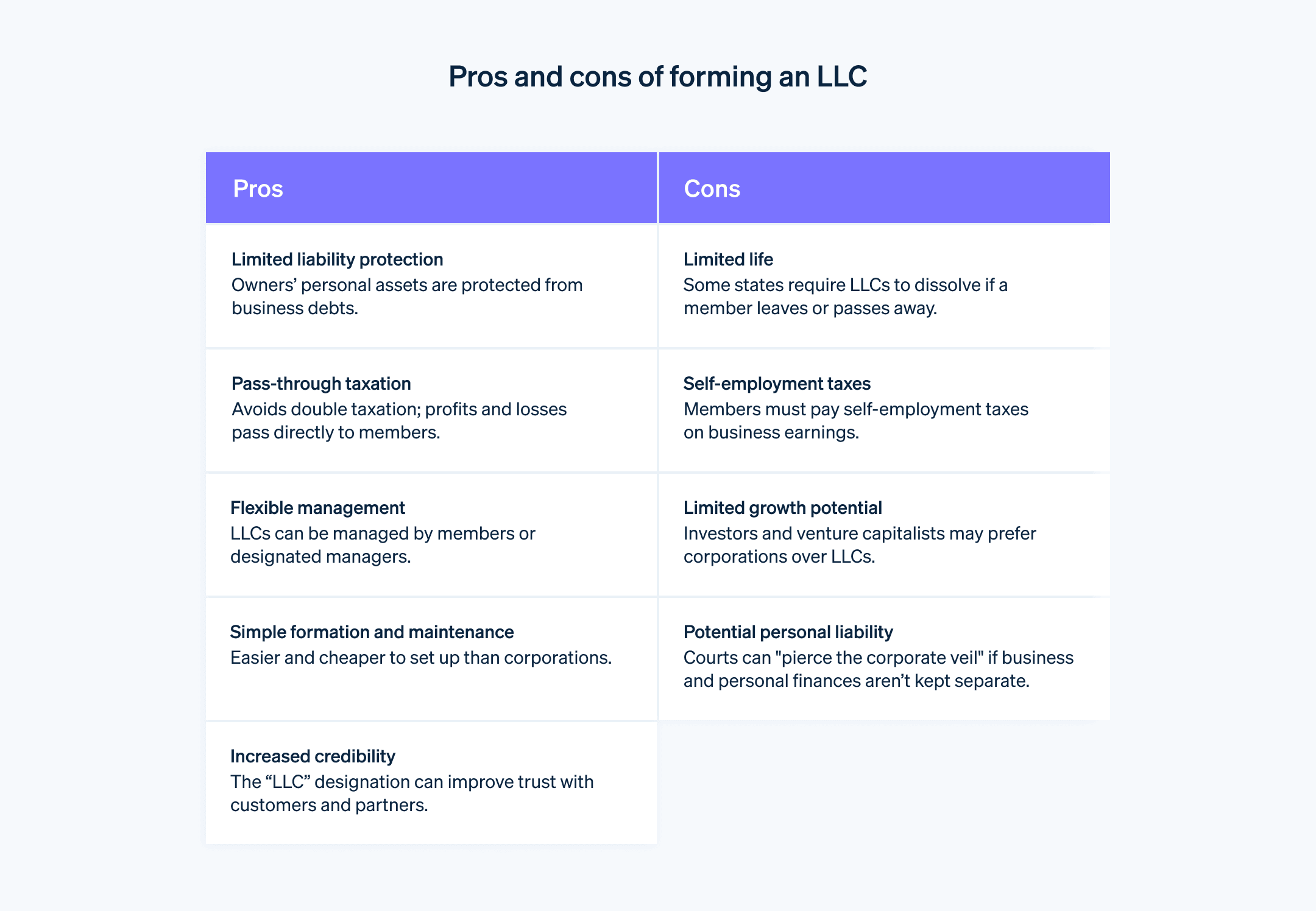
有限责任公司税务基础
有限责任公司的征税方式取决于成员(所有者)数量及选择的税收分类。在选择税收分类时,建议咨询税务专业人士评估具体情况和目标——因为税收分类将显著影响整体税负与财务状况。
单一成员有限责任公司
美国国税局认定标准: 根据默认规定,美国国税局将单一成员有限责任公司视为税收透明体,即企业收支需纳入所有者个人所得税申报表(1040 表格附表 C)。
自雇税: 企业所有者需就有限责任公司利润缴纳自雇税。
税务身份变更: 企业所有者可通过向美国国税局提交相应申请表,选择将有限责任公司作为S 类公司或 C 类公司进行纳税。
多成员有限责任公司
美国国税局认定标准: 根据默认规则,多成员有限责任公司按合伙企业模式纳税。该公司需向美国国税局提交信息申报表(1065 表格)报告收支情况,但企业自身不缴纳所得税。每位成员根据持股比例(年度发放的 K-1 附表注明),在个人纳税申报表中申报其份额的收益与亏损。
自雇税: 各位成员需就其分得的有限责任公司利润份额缴纳自雇税。
税务身份变更: 多成员有限责任公司可通过向美国国税局提交必要申请表,选择作为 S 类公司或 C 类公司进行纳税。
替代性税收分类
S 类公司: 选择 S 类公司纳税模式可通过允许所有者获取薪资与股息的方式带来潜在税收优势,从而可能降低自雇税负。
C 类公司: 选择作为 C 类公司纳税将面临双重征税:公司需就利润缴纳企业所得税,股东还需对所得股息缴纳个人所得税。
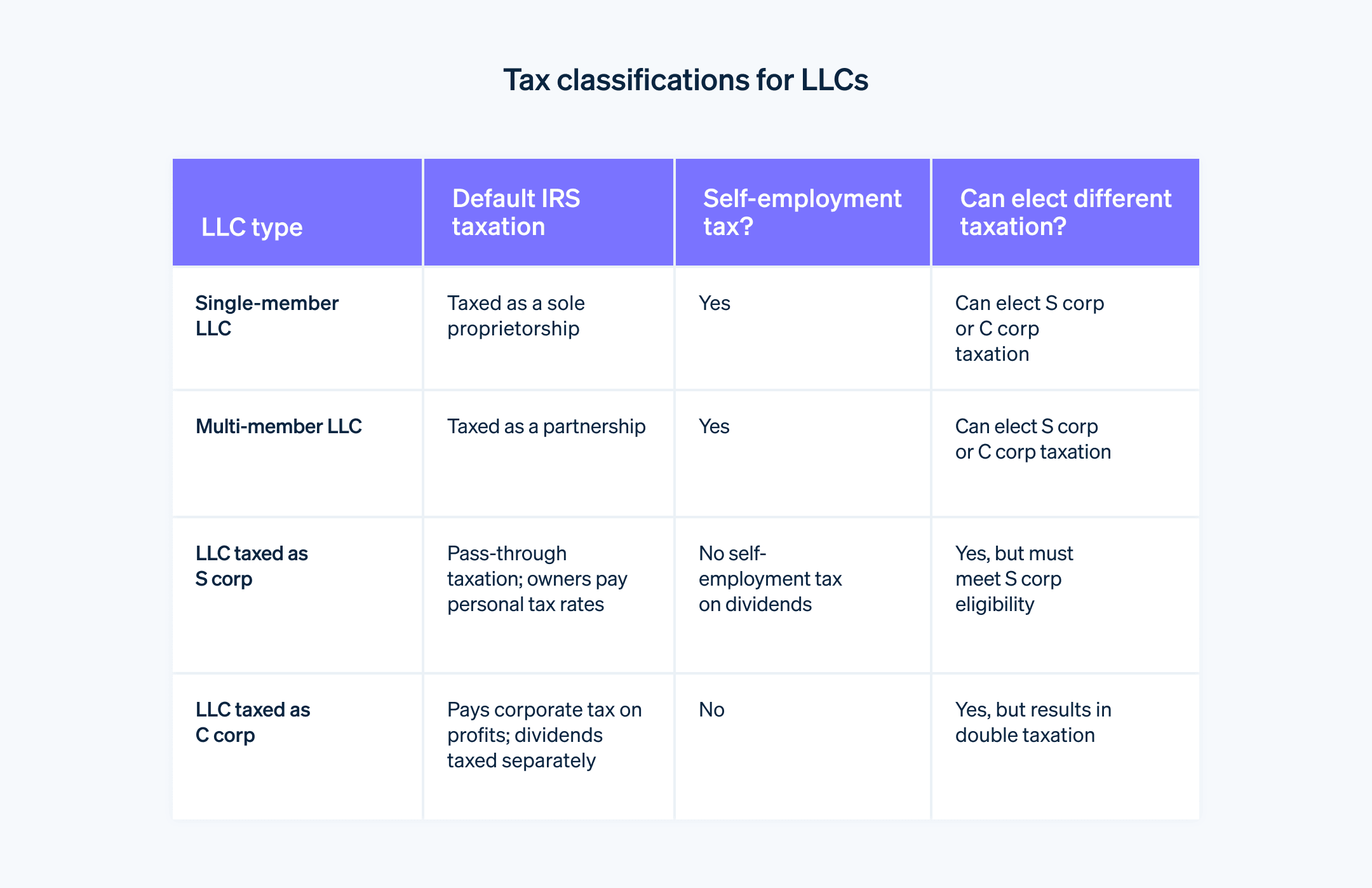
如何为您的有限责任公司选择合适的注册州
在选择有限责任公司注册州时,建议咨询熟悉各州有限责任公司法律细节的商业律师或税务专家,以获得针对性指导。除专业建议外,您还可根据以下因素判断哪个州最符合企业的实际需求。
实体存在要求: 若企业在特定州拥有实体店面、办公场所或主要运营业务,则在该州注册有限责任公司是更合理的选择——因为无论有限责任公司在何地正式成立,都需遵守当地法律与税务规定。
州级税收: 需综合考量各州税收环境:例如得克萨斯、佛罗里达和内华达等州不征收个人所得税,该政策可能基于您选择的有限责任公司税收结构产生利好影响。
州特别法规: 各州对有限责任公司均设有独立的法律监管体系,涵盖责任保护、申报要求和治理结构等不同方面。其中特拉华与内华达等州因具备亲商法律体系及保护有限责任公司成员的完善判例而备受青睐。
成本: 各州对有限责任公司设有不同的初始注册费、年度报告费、特许经营税及其他维护成本,这些费用在州际间存在显著差异。
投资者考量要素: 若企业有融资需求,某些州对投资者更具吸引力。例如特拉华州因拥有可预测的法律体系和完善的公司法体系,备受投资者青睐。
隐私: 怀俄明与内华达等州为有限责任公司所有者提供更强的隐私保护,且不要求在公开申报文件中披露成员信息。
未来商业需求: 需综合考量企业业务的可扩展性与未来发展需求。若计划跨州扩张,选择具备便利扩张监管环境的州份可能更具战略价值。
便利性与熟悉度优势: 在本州注册有限责任公司可获得便利性优势及对地方法律与实践的熟悉度:若企业主要经营活动和银行业务均集中于本地,此举还能简化运营流程。
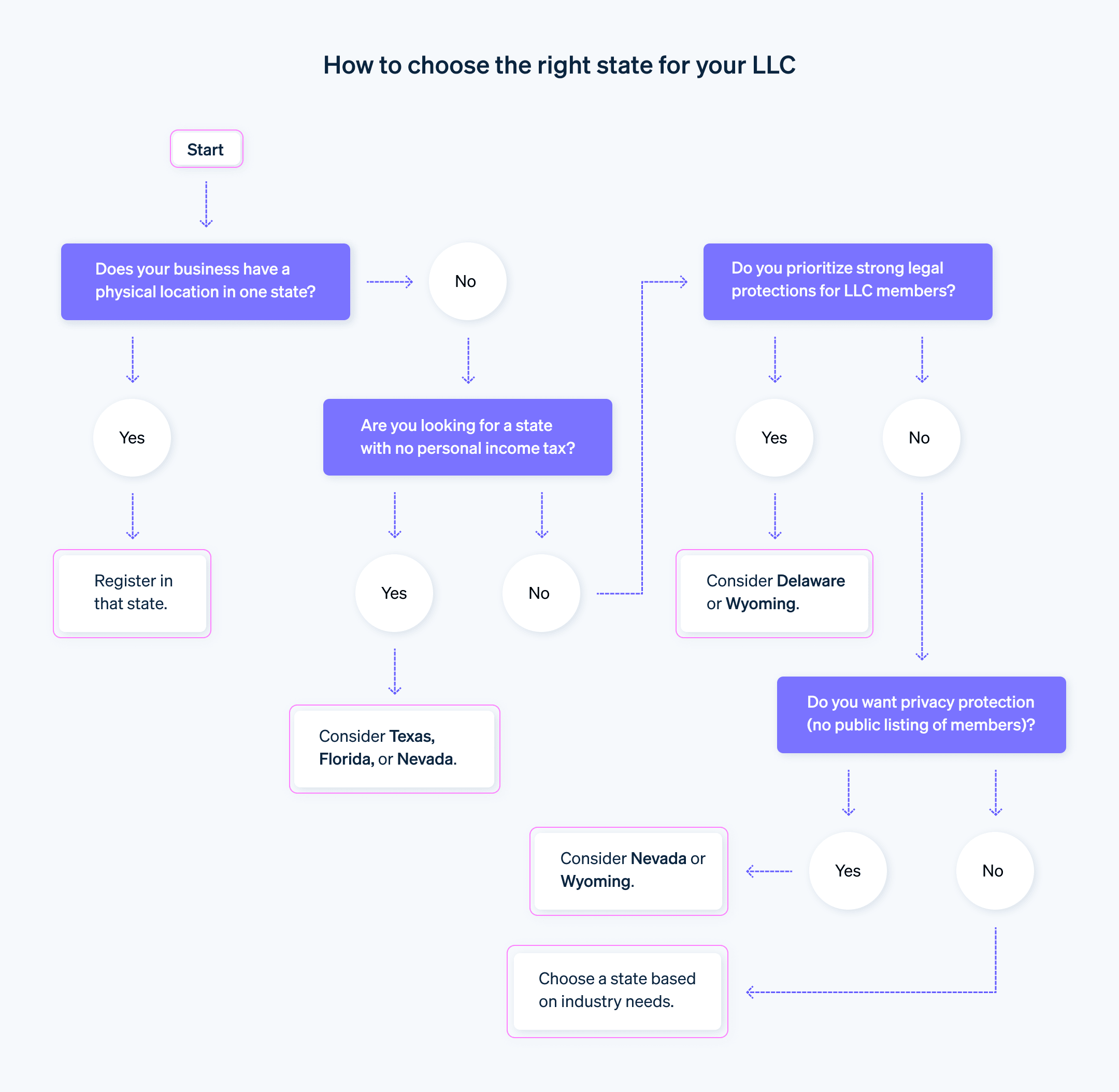
最适合注册有限责任公司的州
多个州为有限责任公司提供有利的商业环境、法律保护和税收政策。以下是适合注册有限责任公司的主要州份推荐。
特拉华州: 特拉华州以其先进灵活的商业法律(尤其在公司法领域)著称。该州衡平法院专司商业案件,能快速解决公司纠纷,且拥有完善判例体系,因此众多大型企业和有限责任公司青睐在此注册。特拉华州对州外经营的本地实体免征州级企业所得税,不要求有限责任公司成员公开披露姓名,并允许在单一有限责任公司架构下设立独立"系列"子公司。
怀俄明州: 怀俄明州拥有强大的资产保护与隐私法律体系:不仅为有限责任公司成员提供扣押令保护,还允许通过信托实现匿名所有权。该州作为全美首个创立有限责任公司制度的司法管辖区,始终保持着低监管负担的亲商环境。怀俄明州不征收个人或企业州所得税,免收特许经营税,且企业运营费用低廉。
内华达州: 内华达州具备强有力的资产保护法与隐私保护制度:不要求披露有限责任公司成员信息,对有限责任公司的管理和所有权限制极少。该州不征收州级企业所得税、个人所得税及特许经营税。
得克萨斯州: 得克萨斯州拥有广阔的市场、强劲的经济体量以及亲商的营商环境,为小型企业和初创公司提供大量优惠政策。该州虽基于收益征收特许经营税,但免收州级个人所得税且商业税负相对较低。得州有限责任公司可采用成员管理或经理管理模式,且成立时无公告要求,为企业节省时间和成本。
佛罗里达州: 佛罗里达州经济持续增长且税收结构优越:不征收州级个人所得税。与特拉华州类似,该州允许在单一有限责任公司架构下设立独立"系列"子公司,并为有限责任公司成员提供扣押令保护——这种保护机制能将个人资产与责任风险隔离。该州尤其受房地产投资者和服务型企业的青睐。
南达科他州: 南达科他州因其优越的商业环境逐渐受到关注:监管要求极简且隐私保护法律健全。该州不征收企业或个人州所得税,企业注册费用低廉,并提供独特的信托结构以增强资产保护。
阿拉斯加州: 阿拉斯加州的独特优势在于无州销售税,这对在本州内大量销售的企业尤为有利。该州其他税收优惠包括免征个人所得税和特许经营税。其低人口密度与丰富的自然资源对特定类型企业构成发展优势。
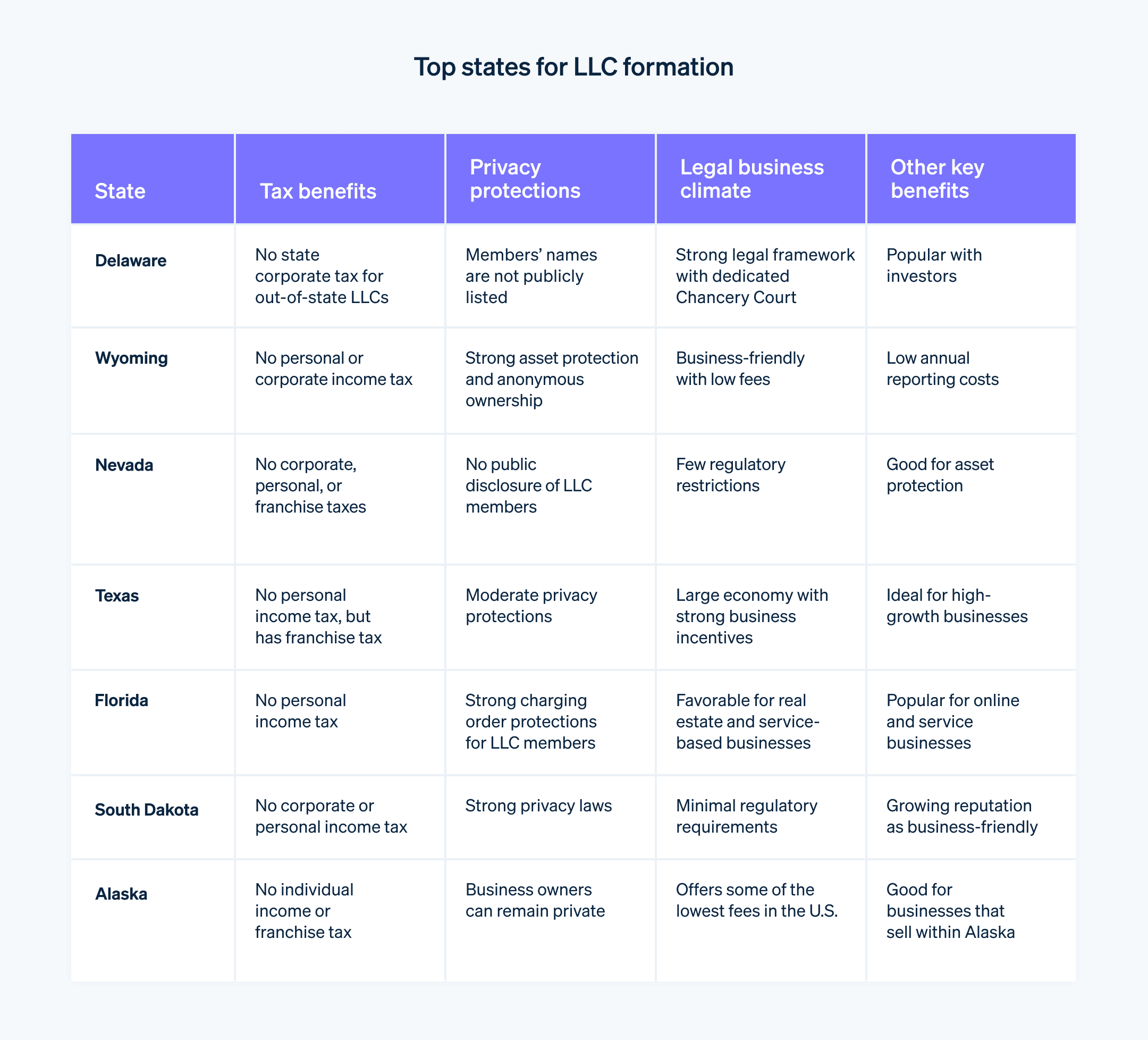
非公民注册有限责任公司
虽然非公民可以在美国成立有限责任公司,但该过程需要周密规划并遵守法律和税务义务。为顺利完成此流程,建议咨询熟悉美国及国际商法的法律与财务专家。以下简要说明非美国公民在有限责任公司成立流程中的特殊注意事项。
身份验证要求: 由于非公民无法凭借社会安全号码 (SSN) 来获取雇主识别号码 (EIN),他们必须通过提交美国国税局 SS-4 表格申请 EIN(必要时还需通过电话与国税局进行后续沟通)。
银行业务挑战: 为非公民的有限责任公司开设银行账户通常更为复杂。多数美国银行要求开户人亲自到场并提供美国地址证明,这对非居民而言可能较为困难。非公民可能需要专程赴美才能满足这些要求。
注册代理人要求: 虽然公民和非公民成立有限责任公司均需指定注册代理人,但缺乏美国实际地址的非公民通常需要委托专业注册代理服务,而非由内部人员担任此职。
税务义务: 非公民可能面临更复杂且高成本的税务义务。他们需就有限责任公司产生的收入缴纳美国税款,同时可能还需向母国申报并支付相应税费。非公民还必须遵守诸如《外国账户税收合规法案》(FATCA) 等税收法规。
所有权和管理层: 成为有限责任公司成员并无公民身份或居住要求,但存在外籍成员可能影响该公司获得特定税收分类的资格。例如,S 类股份有限公司的股东必须为美国公民或永久居民。
合规性与披露要求: 非公民可能面临额外的合规性与披露要求。例如,若有限责任公司由外国实体控股,则需提交5472 表格,用于申报该有限责任公司与其外国所有者之间的交易往来。
签证状态: 希望在美国境内直接管理其有限责任公司的非公民,必须持续保持合法的签证身份。
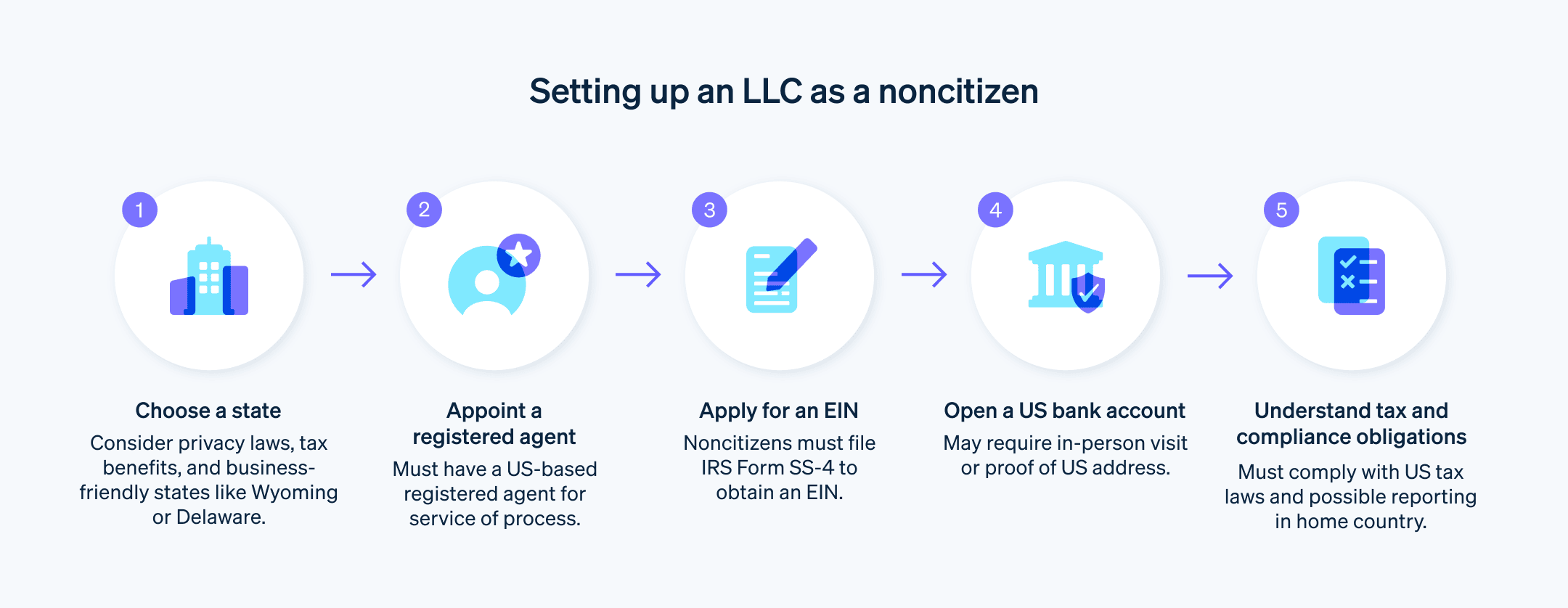
Stripe Atlas 如何提供帮助
Stripe Atlas 可为贵公司搭建法律架构,助力在两个工作日内从全球任何地点完成融资、开设银行账户及接收付款。
已有超 7.5 万家公司通过 Atlas 完成注册,其中包括获 Y Combinator、a16z 与 General Catalyst 等顶级投资机构支持的初创公司。
申请使用 Atlas 注册公司
通过 Atlas 申请注册公司仅需不到 10 分钟。您可自主选择公司架构,即时核验公司名称是否可用,并可添加最多四位联合创始人。您还需确定股权分配方案,预留一定比例的股权供未来投资者与员工认购,指定公司管理人员,并通过电子签名完成所有文件签署。所有联合创始人也将收到邮件邀请,通过电子签名签署其对应文件。
在获取雇主识别号 (EIN) 前开通收款和银行服务
完成公司注册后,Atlas 会为您申请雇主识别号码 (EIN)。持有美国社会保障号、美国地址及手机号码的创始人可享受美国国税局 (IRS) 的加急处理服务,其他创始人则需通过标准流程申请,耗时可能稍长。此外,Atlas 支持在 EIN 下发前进行收款与银行开户操作,让您在 EIN 获批前即可开始收款并完成交易。
无现金创始人股权认购
创始人可使用知识产权(如版权或专利)而非现金认购初始股份,相关认购凭证将存储在 Atlas 管理平台中。使用该功能需满足知识产权估值不超过 100 美元的条件;若您持有的知识产权价值高于此限额,请在操作前咨询专业律师。
自动提交 83(b) 税务申报
创始人可通过提交 83(b) 税务申报降低个人所得税负。无论您是美国籍或非美国籍创始人,Atlas 均可代为完成申报流程——采用 USPS 认证邮件寄送并附带物流追踪服务。您可直接在 Stripe 管理平台获取已签收的 83(b) 申报表及官方寄送凭证。
全球顶尖水准的公司法律文件
Atlas 为您提供创办公司所需的全部法律文件。Atlas 的 C 类公司文件由全球顶尖风投律所美国科律律师事务所 Cooley 联合设计,旨在助您立即启动融资,并确保公司获得全方位法律保护,涵盖股权架构、权益分配及税务合规等核心领域。
Stripe Payments 服务首年免费,更享价值 5 万美元的合作伙伴专属优惠与折扣
Atlas 与顶级合作伙伴深度联动,为创始人提供独家优惠与资源支持,涵盖 AWS、Carta、Perplexity 等行业领军企业的工程开发、税务合规、财务管理及运营必备工具折扣,更免费赠送首年特拉华州法定注册代理服务。作为 Atlas 用户,您还将解锁 Stripe 专属权益——最高 10 万美元交易额的全年免费支付处理服务。
了解关于 Atlas 如何助您快速轻松地创立新企业的更多信息,或立即开始使用。
本文中的内容仅供一般信息和教育目的,不应被解释为法律或税务建议。Stripe 不保证或担保文章中信息的准确性、完整性、充分性或时效性。您应该寻求在您的司法管辖区获得执业许可的合格律师或会计师的建议,以就您的特定情况提供建议。